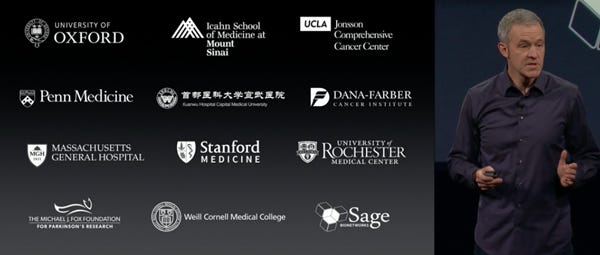Apple Execs Think They Can Improve Your Medical Research
March 9, 2015
Meet ResearchKit--a framework to design apps to find medical study participants and collect information from them.
Chris Newmarker
|
Apple's senior vice president of operations Jeff Williams on Monday showed off partners already lined up for ResearchKit apps. |
Apple Watch may have scaled back health tracking features from what was previously expected. But there is one area related to medtech where Apple expects to make a difference faster: medical research.
Apple's live product unveiling event on Monday included news of a ResearchKit to complement Apple's HealthKit, which already has 900 apps to help people track and manage their health.
The ResearchKit will "transform medical research in a way that's truly profound," Apple CEO Tim Cook said.
The thing Apple is seeking to replace is those medical research volunteer flyers with rip-off stubs seen at so many college campus's and clinics. The vision is that apps could be used to find research subjects among the 700 million iPhone users around the world, using their phones to collect information from them.
The ResearchKit, which is open source, is going live next month with five original apps:
Parkinson's disease app mPower from the University of Rochester, Xuanwu Hospital, Capital Medical University, and Sage Bionetworks;
Breast cancer app Share the Journey from Dana-Farber Cancer Institute, UCLA School of Public Health, Penn Medicine, and Sage Bionetworks;
Diabetes app GlucoSuccess from Massachusetts General Hospital;
Asthma app Asthma Health from Mount Sanai Hospital and Weill Cornell Medical College;
Cardiovascular disease app MyHeart Counts from Stanford Medicine and the University of Oxford.
The mPower app, for example, includes a finger coordination test, voice analysis and movement tracking via a Parkinson's disease study subject's iPhone.
Apple boasted that signing up for studies and providing consent is seamless with the mPower app. The idea is to make it simple for Parkinson's patients to take tests and perform tasks from researchers.
The apps work in such a way that Apple does not have access to the data, said Apple's senior vice president of operations Jeff Williams. "You decide whether to participate. You decide how your data is shared. You can see the data you're sharing."
Refresh your medical device industry knowledge at BIOMEDevice Boston, May 6-7, 2015. |
Chris Newmarker is senior editor of Qmed and MPMN. Follow him on Twitter at @newmarker.
Like what you're reading? Subscribe to our daily e-newsletter.
About the Author(s)
You May Also Like


